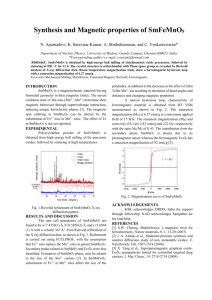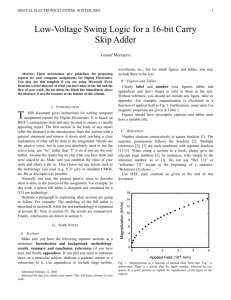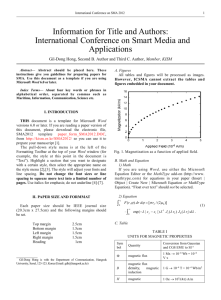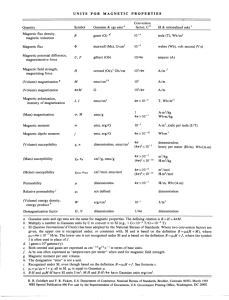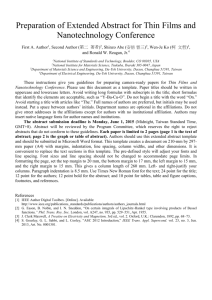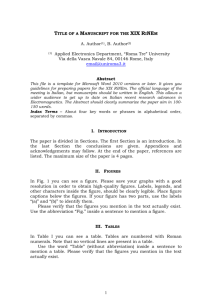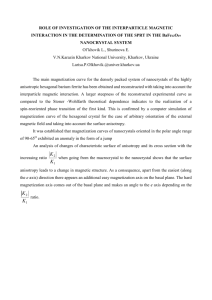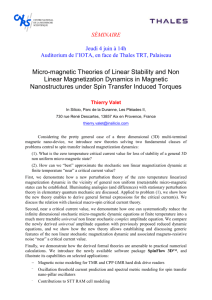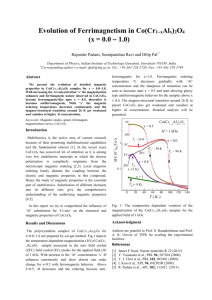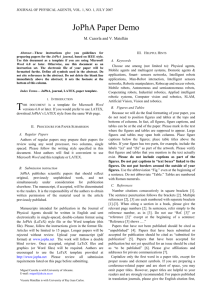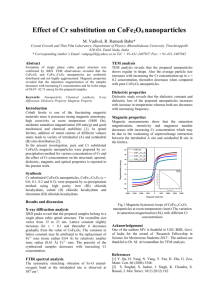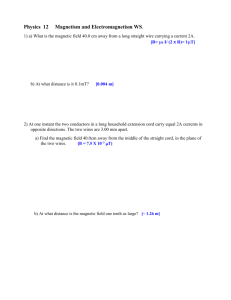View
advertisement
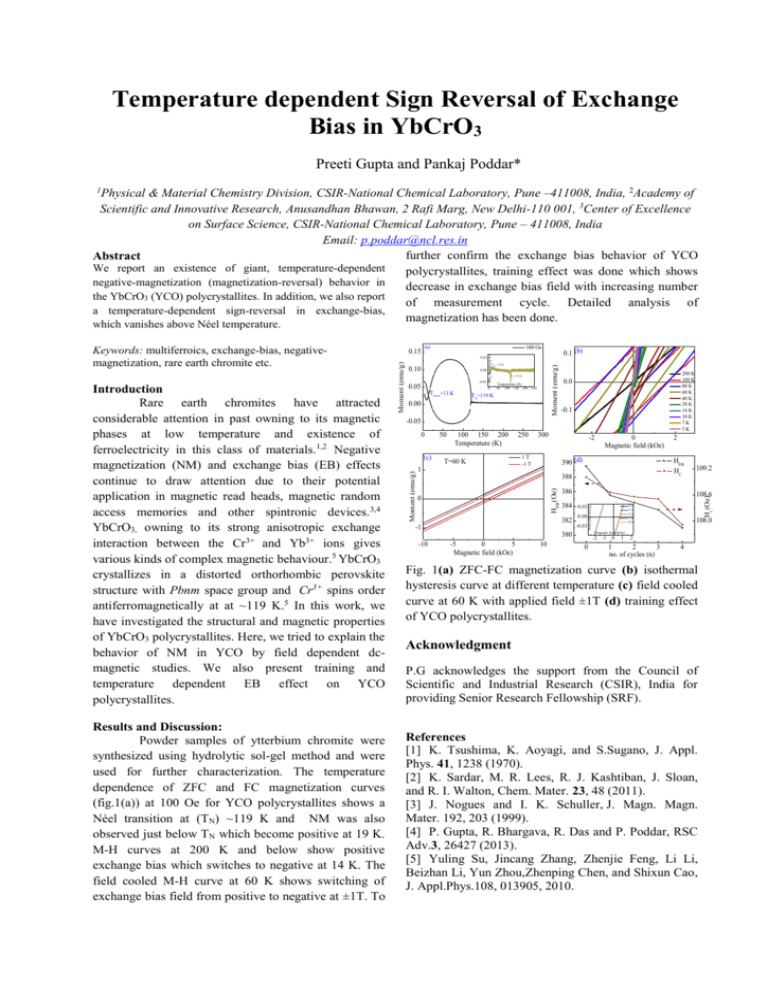
Temperature dependent Sign Reversal of Exchange Bias in YbCrO3 Preeti Gupta and Pankaj Poddar* Physical & Material Chemistry Division, CSIR-National Chemical Laboratory, Pune –411008, India, 2Academy of Scientific and Innovative Research, Anusandhan Bhawan, 2 Rafi Marg, New Delhi-110 001, 3Center of Excellence on Surface Science, CSIR-National Chemical Laboratory, Pune – 411008, India Email: p.poddar@ncl.res.in further confirm the exchange bias behavior of YCO Abstract We report an existence of giant, temperature-dependent polycrystallites, training effect was done which shows negative-magnetization (magnetization-reversal) behavior in decrease in exchange bias field with increasing number the YbCrO3 (YCO) polycrystallites. In addition, we also report of measurement cycle. Detailed analysis of a temperature-dependent sign-reversal in exchange-bias, magnetization has been done. 1 which vanishes above Néel temperature. Results and Discussion: Powder samples of ytterbium chromite were synthesized using hydrolytic sol-gel method and were used for further characterization. The temperature dependence of ZFC and FC magnetization curves (fig.1(a)) at 100 Oe for YCO polycrystallites shows a Nèel transition at (TN) ~119 K and NM was also observed just below TN which become positive at 19 K. M-H curves at 200 K and below show positive exchange bias which switches to negative at 14 K. The field cooled M-H curve at 60 K shows switching of exchange bias field from positive to negative at ±1T. To 0.10 0.00 -0.03 0.05 0 Tcross=13 K 0.1 (b) Moment (emu/g) Tcross=13 K TN=119 K Temperature (K) 50 100 150 200 250 TN=119 K 0.00 200 K 100 K 80 K 60 K 40 K 20 K 14 K 10 K 7K 5K 0.0 -0.1 -0.05 0 (c) 50 100 150 200 Temperature (K) T=60 K 1 250 300 -2 1T -1 T 0 Magnetic field (kOe) 390 (d) HEB HC 386 384 382 0.00 -0.03 -1 -5 0 5 Magnetic field (kOe) 10 0n 1n 2n 3n 4n 108.0 Magnetic field (kOe) 380 -10 109.2 108.6 0.03 Moment (emu/g) HEB (Oe) 388 0 2 Hc (Oe) dMFC/dt (emu/g K) 100 Oe 0.03 Moment (emu/g) Introduction Rare earth chromites have attracted considerable attention in past owning to its magnetic phases at low temperature and existence of ferroelectricity in this class of materials.1,2 Negative magnetization (NM) and exchange bias (EB) effects continue to draw attention due to their potential application in magnetic read heads, magnetic random access memories and other spintronic devices.3,4 YbCrO3, owning to its strong anisotropic exchange interaction between the Cr3+ and Yb3+ ions gives various kinds of complex magnetic behaviour.5 YbCrO3 crystallizes in a distorted orthorhombic perovskite structure with Pbnm space group and Cr3+ spins order antiferromagnetically at at ~119 K.5 In this work, we have investigated the structural and magnetic properties of YbCrO3 polycrystallites. Here, we tried to explain the behavior of NM in YCO by field dependent dcmagnetic studies. We also present training and temperature dependent EB effect on YCO polycrystallites. (a) 0.15 Moment (emu/g) Keywords: multiferroics, exchange-bias, negativemagnetization, rare earth chromite etc. -2 -1 0 0 1 2 1 2 3 no. of cycles (n) 4 Fig. 1(a) ZFC-FC magnetization curve (b) isothermal hysteresis curve at different temperature (c) field cooled curve at 60 K with applied field ±1T (d) training effect of YCO polycrystallites. Acknowledgment P.G acknowledges the support from the Council of Scientific and Industrial Research (CSIR), India for providing Senior Research Fellowship (SRF). References [1] K. Tsushima, K. Aoyagi, and S.Sugano, J. Appl. Phys. 41, 1238 (1970). [2] K. Sardar, M. R. Lees, R. J. Kashtiban, J. Sloan, and R. I. Walton, Chem. Mater. 23, 48 (2011). [3] J. Nogues and I. K. Schuller, J. Magn. Magn. Mater. 192, 203 (1999). [4] P. Gupta, R. Bhargava, R. Das and P. Poddar, RSC Adv.3, 26427 (2013). [5] Yuling Su, Jincang Zhang, Zhenjie Feng, Li Li, Beizhan Li, Yun Zhou,Zhenping Chen, and Shixun Cao, J. Appl.Phys.108, 013905, 2010.
